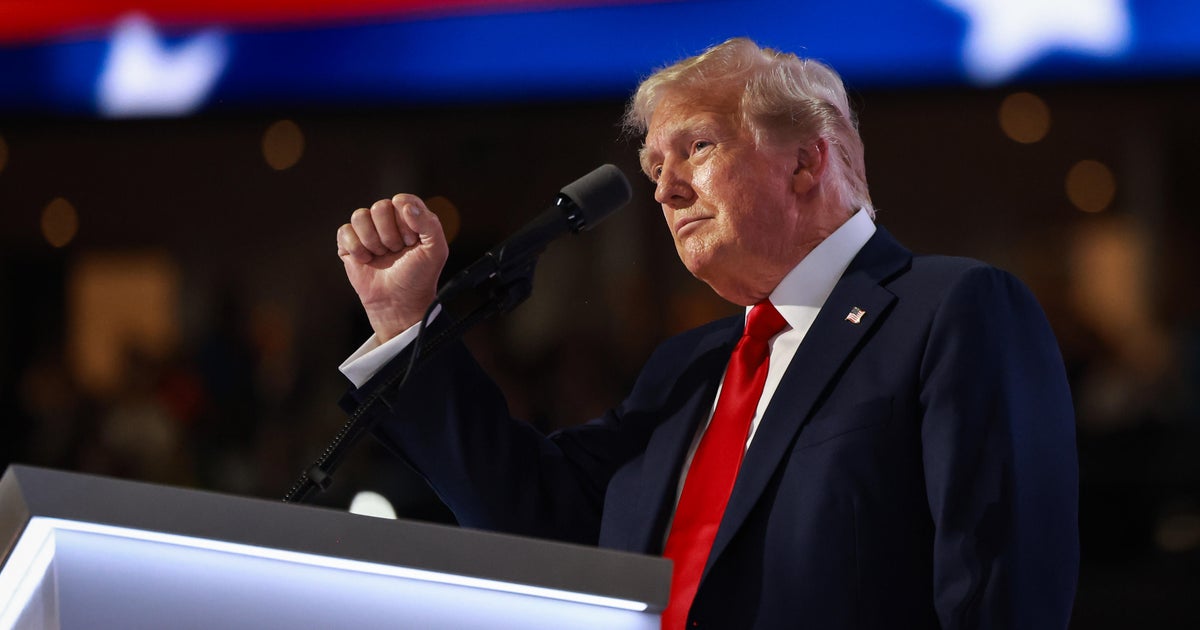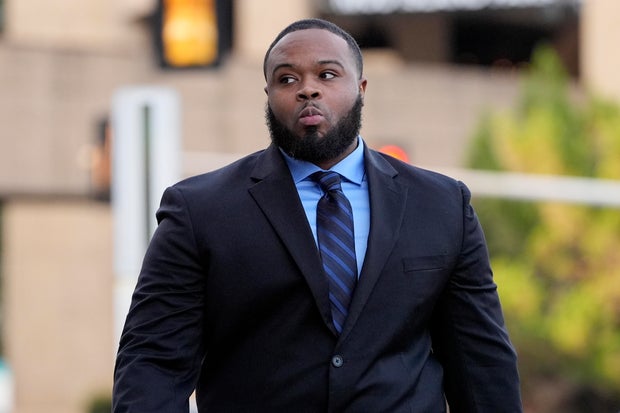CBS News
Silicon shift? Major tech titans throw financial, political support to Trump

Milwaukee — Amid the pomp and partying at the Republican National Convention, one development is adding to the air of triumphalism in Milwaukee: A slew of major tech players have turned their political and financial support to former President Donald Trump and the Republican Party, signaling a possible realignment in support from traditionally liberal Silicon Valley.
It began with reports at the beginning of the week that Elon Musk had pledged $45 million a month for at least the next three months to Trump’s election effort. This was reinforced by the selection of Ohio Sen. JD Vance, a former venture capitalist who has nurtured close relationships with right-leaning or libertarian tech leaders in Silicon Valley, as Trump’s running mate. By Tuesday, Marc Andreessen and Ben Horowitz, co-founders of a high-flying venture capital firm, had endorsed Trump on their podcast and said they would kick in financially to support the former president.
It’s an adage in American politics that “money follows money,” so many expect the influx of contributions from Musk and the other tech moguls to generate a lot more cash for Republicans in the coming weeks. Those at the vanguard of this trend are taking full advantage of the momentum.
Venture capitalist David Sacks, a past supporter of Democrat Hillary Clinton and relatively early adopter of the Trump tech money machine, is urging his comrades to get off the sidelines and give to the Republican nominee. He took to X this week with a social media post that listed the growing number of Trump contributors, including Musk, Andreessen Horowitz, Joe Lonsdale, a co-founder of the data mining company, Palantir, and Doug Leone, the billionaire venture capitalist and major tech investor, who have all given to Trump.
“Come on in, the water’s warm,” Sacks wrote.
An angel investor in major companies like SpaceX, Uber and Palantir, Sacks believes Trump has a much larger base of support in Silicon Valley than is readily apparent but that those who back him are afraid to admit it publicly in a place where the prevailing politics have been overwhelmingly liberal. Still, he says his fellow techies are gaining the courage of their convictions and senses an inflection point.
“I think what we’re seeing is that each incremental endorsement makes the next one more likely,” Sacks told CBS News in an email. “Now the dominoes are falling quite quickly.”
How significant this Silicon shift is – and how lasting it will be – is a matter of debate. Some of those who closely track campaign finance say it’s a bit too early to tell. Moreover, there’s no sign yet that most of the dominant tech platforms, like Meta, Google or Apple, or their leaders, are moving into the Trump camp.
“This isn’t about Big Tech players who have traditionally leaned Democratic switching sides,” said Anna Massoglia of OpenSecrets, a nonpartisan watchdog group that keeps tabs on political donations. “Instead, we’re seeing an anti-establishment conservative faction starting to become more politically active,” Massogila added, cautioning that there is not enough data yet to know whether this represents a sea change or just a temporary shift.
Either way, campaign finance experts say the amount of money moving to Trump is significant and could have a material effect in this election cycle. If Elon Musk follows through on his pledge $45 million per month pledge, he’d immediately catapult into the ranks of the top five or 10 donors of the past few elections, including mega-donors like George Soros, who backs Democrats, and Miriam Adelson and her late husband Sheldon, who has bankrolled Trump the tune of more than $200 million.
Musk and many of his fellow tech titans who have opened up the spigot for Trump are backing Trump for the first time. Some have supported Democrats, including Hillary Clinton, Barack Obama and Joe Biden in 2020.
“What’s new here is the emergence of a group of people who were not previously committed now spending hundreds of millions of dollars trying to elect Republicans and certainly trying to get Donald Trump elected,” says Saurav Ghosh, director of federal campaign finance reform at the Campaign Legal Center.
But why is this shift happening in the first place? There are different theories.
To the Trump campaign, the shift is the result of its candidate’s pro-business agenda.
“In the tech sector we’ve seen this surge of support as fundamentally driven by President Trump’s pro-business vision, reducing regulatory burdens and producing an economic environment in which American innovation can thrive,” said Brian Hughes, a senior adviser to the Trump campaign.
In some instances, the connection between policies and financial support from the tech world has been explicit. The cryptocurrency industry’s underwriting of the Trump election effort is one such example. After a months-long conversation between prominent crypto investors — including Cameron and Tyler Winklevoss — and the Trump campaign, the former president publicly embraced cryptocurrencies. The campaign’s website declared that it was part of a counteroffensive against “socialistic government control.” Not long after that, the Winklevoss twins each donated a cool $1 million in Bitcoin to Trump, while slapping at Mr. Biden’s “war against crypto.” The Trump campaign opened a portal to accept crypto donations, the first major party general election presidential campaign to do so.
The crypto industry’s embrace of Trump has been disconcerting to some Democrats. The Washington Post reported that Biden administration officials held a meeting last week to try to repair the relationship. According to the report, Biden senior adviser Anita Dunn “appeared taken aback by the open hostility” from the tech start-up community.
Even in Trump world there is a sharp debate about how meaningful the recent flow of tech money into the Trump reelection effort is. Roger Stone, one of the most fervent Trump supporters and a MAGA diehard, expressed skepticism.
“I suspect it’s transactional for this election,” Stone said in the bar of Milwaukee’s tony Trade Hotel, where the high command of the Trump campaign was staying during the convention. He attributed the development to Vance’s selection as VP.
It is true that many of the biggest players in Silicon Valley who have supported Trump, including Musk and David Sacks, are also big boosters of Vance. Musk hailed Trump’s choice on X shortly after it was announced. For his part, Sacks kicked in a million dollars to Vance’s 2022 Ohio Senate campaign, and Vance was instrumental in organizing a $12 million Trump fundraiser that Sacks co-hosted in June.
But the tech mogul most important to Vance’s political rise has a more complicated history with Trump. Peter Thiel, the mercurial co-founder of PayPal and Palantir, met Vance when he was a law student at Yale and took him under his wing, giving him jobs, contributing lavishly to his political campaigns, and eventually introducing him to Trump.
Thiel was the first major Silicon Valley player to open up his wallet for Trump, when he donated $1.25 million during the 2016 campaign. That earned him a speaking gig at the GOP convention in Cleveland and sent tremors through Silicon Valley and drew scorn from many other tech leaders.
But tech titans can be fickle with their money. Eight years after breaking a Silicon Valley taboo and wholeheartedly backing Trump, Thiel decided that he is disillusioned with the former president -– and other politicians — who he believes haven’t delivered the change they promised. He recently announced that he won’t be giving any money to Trump or other candidates. “You hold a gun to my head and I will vote for Trump,” he said at the Aspen Ideas Festival in June.
CBS News
CIA officer who drugged, photographed and sexually assaulted dozens of women gets 30 years in prison as victims stare him down

A longtime CIA officer who drugged, photographed and sexually assaulted more than two dozen women in postings around the world was sentenced to 30 years in federal prison Wednesday after an emotional hearing in which victims described being deceived by a man who appeared kind, educated and part of an agency “that is supposed to protect the world from evil.”
Brian Jeffrey Raymond, with a graying beard and orange prison jumpsuit, sat dejectedly as he heard his punishment for one of the most egregious misconduct cases in the CIA’s history. It was chronicled in his own library of more than 500 images that showed him in some cases straddling and groping his nude, unconscious victims.
“It’s safe to say he’s a sexual predator,” U.S. Senior Judge Colleen Kollar-Kotelly said in imposing the full sentence prosecutors had requested. “You are going to have a period of time to think about this.”
Prosecutors say the 48-year-old Raymond’s assaults date to 2006 and tracked his career in Mexico, Peru and other countries, all following a similar pattern.
He would lure women he met on Tinder and other dating apps to his government-leased apartment and drug them while serving wine and snacks. Once they were unconscious, he spent hours posing their naked bodies before photographing and assaulting them. He opened their eyelids at times and stuck his fingers in their mouths.
U.S. Embassy and Consulates in Mexico
One by one, about a dozen of Raymond’s victims who were identified only by numbers in court recounted how the longtime spy upended their lives. Some said they only learned what happened after the FBI showed them the photos of being assaulted while unconscious.
“My body looks like a corpse on his bed,” one victim said of the photos. “Now I have these nightmares of seeing myself dead.”
One described suffering a nervous breakdown. Another spoke of a recurring trance that caused her to run red lights while driving. Many told how their confidence and trust in others had been shattered forever.
“I hope he is haunted by the consequences of his actions for the rest of his life,” said one of the women, who like others stared Raymond down as they walked away from the podium.
Reading from a statement, Raymond told the judge that he has spent countless hours contemplating his “downward spiral.”
“It betrayed everything I stand for and I know no apology will ever be enough,” he said. “There are no words to describe how sorry I am. That’s not who I am and yet it’s who I became.”
In October 2021, the FBI issued a notice to the public, seeking other potential victims of and additional information about Raymond, saying that some women depicted in the incriminating photos and videos remain unidentified.
In a statement Wednesday, authorities praised all the victims who came forward.
“The FBI thanks the brave women who shared information that furthered this investigation,” said
FBI Assistant Director in Charge David Sundberg of the Washington Field Office. “We recognize our domestic and foreign law enforcement partners who helped bring Raymond to justice for his reprehensible crimes.”
Raymond’s sentencing comes amid a reckoning on sexual misconduct at the CIA. The Associated Press reported last week that another veteran CIA officer faces state charges in Virginia for allegedly reaching up a co-worker’s skirt and forcibly kissing her during a drunken party in the office.
Still another former CIA employee – an officer trainee – is scheduled to face a jury trial next month on charges he assaulted a woman with a scarf in a stairwell at the agency’s Langley, Virginia, headquarters. That case emboldened some two dozen women to come forward to authorities and Congress with accounts of their own of sexual assaults, unwanted touching and what they contend are the CIA’s efforts to silence them.
And yet the full extent of sexual misconduct at the CIA remains a classified secret in the name of national security, including a recent 648-page internal watchdog report that found systemic shortcomings in the agency’s handling of such complaints.
“The classified nature of the activities allowed the agency to hide a lot of things,” said Liza Mundy, author of “Sisterhood: The Secret History of Women at the CIA.” The male-dominated agency, she said, has long been a refuge for egregious sexual misconduct. “For decades, men at the top had free rein.”
CIA has publicly condemned Raymond’s crimes and implemented sweeping reforms intended to keep women safe, streamline claims and more quickly discipline offenders.
Last year, the CIA announced the appointment of Dr. Taleeta Jackson, a seasoned psychologist who previously led the Sexual Assault Prevention Program at the U.S. Navy, as the new head of a dedicated sexual assault and prevention office at CIA.
“There is absolutely no excuse for Mr. Raymond’s reprehensible, appalling behavior,” the agency said Wednesday. “As this case shows, we are committed to engaging with law enforcement.”
But a veil of secrecy still surrounds the Raymond case nearly four years after his arrest. Even after Raymond pleaded guilty late last year, prosecutors have tiptoed around the exact nature of his work and declined to disclose a complete list of the countries where he assaulted women.
Still, they offered an unbridled account of Raymond’s conduct, describing him as a “serial offender” whose assaults increased over time and become “almost frenetic” during his final CIA posting in Mexico City, where he was discovered in 2020 after a naked woman screamed for help from his apartment balcony.
U.S. officials scoured Raymond’s electronic devices and began identifying the victims he had listed by name and physical characteristics, all of whom described experiencing some form of memory loss during their time with him.
One victim said Raymond seemed like a “perfect gentleman” when they met in Mexico in 2020, recalling only that they kissed. Unbeknownst to the woman, after she blacked out, he took 35 videos and close-up photos of her breasts and genitals.
“The defendant’s manipulation often resulted in women blaming themselves for losing consciousness, feeling ashamed, and apologizing to the defendant,” prosecutors wrote in a court filing. “He was more than willing to gaslight the women, often suggesting that the women drank too much and that, despite their instincts to the contrary, nothing had happened.”
Raymond, a San Diego native and former White House intern who is fluent in Spanish and Mandarin, ultimately pleaded guilty to four of 25 federal counts including sexual abuse, coercion and transportation of obscene material. As part of his sentence, the judge ordered him to pay $10,000 to each of his 28 victims.
Raymond’s attorneys had sought leniency, contending his “quasi-military” work at the CIA in the years following 9/11 became a breeding ground for the emotional callousness and “objectification of other people” that enabled his years of preying upon women.
“While he was working tirelessly at his government job, he ignored his own need for help, and over time he began to isolate himself, detach himself from human feelings and become emotionally numb,” defense attorney Howard Katzoff wrote in a court filing.
“He was an invaluable government worker, but it took its toll on him and sent him down a dark path.”
CBS News
Python squeezes Thai woman in her kitchen for 2 hours before she’s rescued by police

Bangkok — A 64-year-old woman was preparing to do her evening dishes at her home outside Bangkok when she felt a sharp pain in her thigh and looked down to see a huge python taking hold of her.
“I was about to scoop some water and when I sat down it bit me immediately,” Arom Arunroj told Thailand’s Thairath newspaper. “When I looked I saw the snake wrapping around me.”
The 13-to-16-foot-long python coiled itself around her torso, squeezing her down to the floor of her kitchen.
“I grabbed it by the head, but it wouldn’t release me,” she said. “It only tightened.”
Kunyakit Thanawtchaikun/AP
Pythons are non-venomous constrictors, which kill their prey by gradually squeezing the breath out of it.
Propped up against her kitchen door, she cried for help but it wasn’t until a neighbor happened to be walking by about an hour and a half later and heard her screams that authorities were called.
Responding police officer Anusorn Wongmalee told The Associated Press on Thursday that when he arrived the woman was still leaning against her door, looking exhausted and pale, with the snake coiled around her.
Police and animal control officers used a crowbar to hit the snake on the head until it released its grip and slithered away before it could be captured.
In all, Arom spent about two hours on Tuesday night in the clutches of the python before being freed.
She was treated for several bites but appeared to be otherwise unharmed in videos of her talking to Thai media shortly after the incident.
Encounters with snakes are not uncommon in Thailand, and last year 26 people were killed by venomous snake bites, according to government statistics. A total of 12,000 people were treated for venomous bites by snakes and other animals 2023.
The reticulated python is the largest snake found in Thailand and usually ranges in size from 5 to 21 feet, weighing up to about 165 pounds. They have been found as big as 33 feet long and 287 pounds.
Smaller pythons feed on small mammals such as rats, but larger snakes switch to prey such as pigs, deer and even domestic dogs and cats. Attacks on humans are not common, though do happen occasionally.
There have also been fatal attacks in Indonesia, where a woman was found inside the belly of a reticulated python that swallowed her whole in June — the fifth person to be devoured by one of the snakes in the country since 2017.
CBS News
After Tyre Nichols’ fatal beating, Memphis officer texted photo of bloodied man to ex-girlfriend, she testifies

A former Memphis police officer charged in the fatal beating of Tyre Nichols sent his ex-girlfriend a photo of the badly injured man on the night he was punched, kicked and hit with a police baton following a traffic stop, according to trial testimony Wednesday.
Brittany Leake, a Memphis officer and Demetrius Haley’s former girlfriend, testified during the criminal trial that she was on the phone with Haley when officers pulled Nichols over for a traffic stop. She said she heard a “commotion,” including verbal orders for someone to give officers his hands.
The call ended, but Haley later texted the photo in a group chat comprising Haley, Leake and her godsister, she testified. Prosecutors displayed the photo for the jury. It showed Nichols with his eyes closed, on the ground with what appeared to be blood near his mouth and his hands behind his back.
Leake said that when she saw the photo, her reaction was: “Oh my God, he definitely needs to go to the Med.”
The Med is shorthand for Memphis’ trauma hospital.
The fatal beating, caught on police bodycams and street surveillance cameras, has sparked protests and calls for police reform. Officers said they pulled over Nichols for reckless driving, but Memphis’ police chief said there was no evidence to substantiate that claim.
Haley, Tadarrius Bean and Justin Smith are on trial after pleading not guilty to charges that they deprived Nichols of his civil rights through excessive force and failure to intervene, and obstructed justice through witness tampering. Their trial began Sept. 9 and is expected to run three to four weeks.
George Walker IV / AP
The Memphis Police Department fired the three men, along with Emmitt Martin III and Desmond Mills Jr., after Nichols’ death. The beating was caught on police video, which was released publicly. The officers were later indicted on the federal charges. Martin and Mills have taken plea deals.
During her testimony Wednesday, Leake said she deleted the photo after she saw it and that sending such a photo is against police policy.
“I wasn’t offended, but it was difficult to look at,” she said.
Leake said Haley had sent her photos before of drugs, and of a person who had been injured in a car accident.
Earlier Wednesday, Martin was on the witness stand for a third day. Defense attorneys tried to show inconsistencies between Martin’s statements to investigators and his court testimony. Martin acknowledged lying about what happened to Memphis Police Department internal investigators, to try to cover up and “justify what I did.”
But Martin said he told the truth to FBI investigators after he pleaded guilty in August, including statements about feeling pressure on his duty belt where his gun was located during the traffic stop, but not being able to see if Nichols was trying to get his gun. Martin has testified that he said “let go of my gun” during the traffic stop.
Martin Zummach, the attorney for Justin Smith, asked Martin if he knew of any reasons why Nichols did not simply say, “I give up.”
“He’s out of it,” Martin said. “Disoriented.”
Martin testified that the situation escalated quickly when Haley pulled his gun and violently yanked Nichols from his car, using expletives and failing to tell Nichols why he had been pulled over and removed from the vehicle.
“He never got a chance to comply,” Martin said.
Nichols, who was Black, was pepper sprayed and hit with a stun gun during the traffic stop, but ran away, police video shows. The five officers, who also are Black, then beat him about a block from his home, as he called out for his mother.
Video shows the officers milling about and talking as Nichols struggled with his injuries. Nichols died Jan. 10, 2023, three days after the beating.
An autopsy report shows Nichols – the father of a boy who is now 7 – died from blows to the head. The report describes brain injuries, and cuts and bruises on his head and elsewhere on his body.
Jesse Guy testified that he was working as a paramedic for the Memphis Fire Department the night of the beating. He arrived at the location after two emergency medical technicians, Robert Long and JaMichael Sandridge.
Guy said he was not told about the medical problems Nichols had experienced before he arrived, and that Nichols was injured, seated on the ground and unresponsive.
Nichols had no pulse and was not breathing, and it “felt like he was lifeless,” Guy said.
In the ambulance, Guy performed CPR and provided mechanical ventilation, and Nichols had a pulse by the time he arrived at the hospital, the paramedic said.
Guy said Long and Sandridge did not say if they had checked Nichols’ pulse and heart rate, and they did not report if they had given him oxygen. When asked by one of Bean’s lawyers whether that information would have been helpful in treating Nichols, Guy said yes.
Long and Sandridge were fired for violating fire department policies after Nichols died. They have not been criminally charged.
The five officers also have been charged with second-degree murder in state court, where they pleaded not guilty. Mills and Martin are expected to change their pleas.
Federal prosecutors have previously recommended a 40-year sentence for Martin. A date has not been set in state court yet.
Nichols worked for FedEx, and he enjoyed skateboarding and photography. The city of Sacramento, where Nichols grew up, named a skatepark in his honor. “Tyre fell in love with skateboarding at a young age and it wasn’t long before it became a part of his lifestyle,” states the resolution approved by the city council. He had a tattoo of his mother’s name.
“Tyre Nichols’ family have been praying for justice and accountability from the very beginning of this tragedy,” Ben Crump and Antonio Romanucci, the civil rights attorneys representing Nichols’ family, said in a statement when the trial began.










